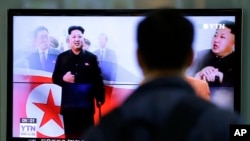This week a top U.N. human rights investigator has held meetings with North Korean diplomats about a possible visit to assess the country’s human rights practices. The negotiations come as North Korea tries to prevent the United Nations from referring the country’s human rights situation to the International Criminal Court.
The meetings, between human rights investigator Marzuki Darusman and North Korean diplomats, follow Darusman’s ground-breaking inquiry into the country’s dire human rights situation.
The United Nations commission of inquiry report, issued earlier this year, documents a network of political prisons in North Korea holding 120,000 people and a list of atrocities that include “extermination, murder, enslavement, torture, imprisonment, rape, forced abortions and other sexual violence.”
Joanna Hosaniak, the deputy director of Citizens Alliance for North Korean Human Rights, cooperated with the U.N. investigator to detail the extent of abuse in that country. She said it is a widespread systematic type of abuse based on a perceived level of loyalty to authorities in Pyongyang.
Thousands of North Koreans can be labeled as hostile because other members of their family in the past either opposed or fell out of favor with the regime. They are then sent to forced labor camps to work 16 to 18 hours a day and given meager food rations.
“Many prisoners die within the first year of being sent to the camp because it takes time for the body, the prisoners say, to adjust to this hard work and adjust to this level of nutrition that they provide. It’s not even nutritious food that they provide,” said Hosaniak.
Phil Robertson, the deputy director for Asia at Human Rights Watch, said the UN commission of inquiry report shows a level of atrocities that has not been seen since the Nazi concentration camps in World War II, and one that requires a unified international response.
“The fact that the commission of inquiry said very clearly that these are human rights abuses without parallel you know in the last 30 or 40 years, indicates that the U.N. has to step back to its original purpose which was to prevent crimes of mass atrocity,” said Robertson.
Human rights groups have strongly endorsed the report’s recommendation to prosecute North Korean officials including leader Kim Jong Un for abuses at the International Criminal Court.
North Korean diplomats have denounced it as a collection of lies, fabrications and smears.
The U.N. General Assembly is expected to vote on the issue in November. Even if a majority of nations vote to prosecute North Korean officials, the measure is likely to be vetoed by China or Russia when it is sent to the U.N. Security Council.
Still, Hosaniak said the report has already succeeded in focusing world attention on human rights abuse in North Korea.
And it has gotten the attention of North Korea, which is discussing the possibility of allowing a U.N. human rights investigator into the country for the first time, if the world body drops efforts to prosecute Pyongyang officials.
“This is what makes them move… they very much are scared of this whole international community notion that they might be held responsible for those crimes,” said Hosaniak.
Robertson said this is a good first step but more needs to be done.
“When there is real leverage, when there is a real threat to hold leaders accountable in North Korea the government will react but I don’t believe for a second that we’re seeing any sort of significant commitment to real rights respecting reform,” said Robertson.
These activists say this is just the beginning of a strategy to keep increasing pressure on North Korea to change and send a message that officials involved in human rights abuses will be held accountable.












